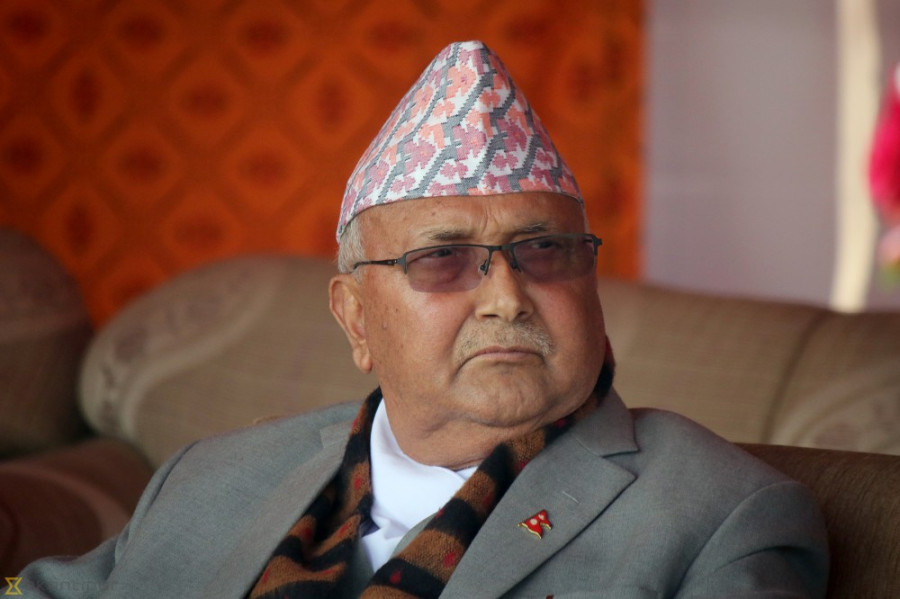Columns
Prime Minister has used a cabinet reshuffle to mask his government’s incompetence
But without solving internal party anomalies, the current government is unlikely to make Nepal prosperous and Nepalis happy.
Achyut Wagle
Politics in Nepal was largely torpid for the last two years since the completion of general elections in 2017. A minor political tweak in the ruling Nepal Communist Party (NCP) leadership and a cabinet reshuffle by Prime Minister KP Oli, therefore, made major headlines. For Nepali electorates accustomed to entertain themselves with many dramatic turns in political events, the NCP secretariat's decision to award executive chairmanship of the Party to Puspa Kamal Dahal and a 'full five-year term' premiership to Oli certainly provided at least a short-lived thrill.
Executive feather
The shake-up had become inevitable, primarily for two reasons: to address Dahal’s discontent over Oli's monopolisation on the exercise of power and, to mask the dismal performance of the majority government. Dahal had started to publicly mention how Oli had agreed, in writing, to hand over the prime ministership to him halfway through the five-year term of the current federal parliament. But, by placating Dahal with the executive chairmanship (emphasis on the executive) Oli's chicanery effectively removes all possible irritants for the next three years.
Dahal's rechristening, for all practical purposes, is unlikely to make any fundamental difference in his ability to wield real political muscle in state affairs. First, as the universal experience has it, there is hardly any role for the ruling party itself, once periodic elections are over and a government is formed thereof. Second, Nepal's own history shows how it has always been suicidal to have two different personalities run the party and the government. This has been true right since the establishment of democracy in 1951 and more so after the restoration of democracy in 1990. The tussle between then Nepali Congress president Krishna Prasad Bhattarai and Prime Minister Girija Prasad Koirala brought down the first elected majority government after 1990. It was an ideological contest on whether the party should have control over the government or whether the government should be allowed to function independently. Similar conflicts occurred when Koirala himself was Congress president and when either Sher Bahadur Deuba or Bhattarai himself were the prime ministers in later years.
Third, the communist ideology and power culture only recognise one all-powerful leadership that invariably controls both the party and the government. Needless to say, the person who heads the government with national assets at his disposal is always far more powerful than any party chief. All these realities are only likely to render Dahal nothing more than a complain machine. But for now, Dahal also seems to have accepted the status quo given the weaker political clout of his faction in the united NCP.
Double mockery
The very rationale of the cabinet reshuffle by Oli is being questioned harshly on social media. This is due to the lack of justification in dropping some ministers who have perceivably performed well while retaining others with an alarmingly unimpressive track record. For example, the ouster of Gokarna Bista from the ministry of labour as against retention of water supply minister Bina Magar, the daughter-in-law of executive chairman Dahal, apparently didn't seem to come from a performance standpoint.
In fact, Oli needed some scapegoats for the sheer underperformance of his government. The security apparatus has failed to nab culprits of high-profile crimes. The economy is in tatters, almost irreversibly. The ruling and opposition parties have together pushed the transitional justice agenda to the backburner. Federalism as a national political system has been fragmented and rendered dysfunctional. And, large-scale corruption has paralysed critical policy formulation, management decisions and project implementation.
Oli’s modus operandi of signing performance contracts with his ministers, a practise that cascaded down to almost every level of government, was not only unconstitutional but also turned out to be a pure mockery. Oli's apparent disregard for these performance scorecards, introduced by himself, during the cabinet reshuffle is a joke.
Deeper troubles
The problems in the NCP, and also in its government, run far deeper than could be addressed by some of the cosmetic endeavours that have occurred. The NCP as a party faces an identity crisis in the absence of any ideological foundation. It has forfeited orthodox communist doctrine by embracing the adult franchise-based parliamentary system. The erstwhile UML faction leans to 'peoples' multiparty democracy' propounded by its late general secretary Madan Bhandari for their philosophical identity whereas the erstwhile Maoist faction is still in search of convincing anti-parliamentary jargon away from Bhandari's exposition but reflexive to classic communist verbosity. This confusion has led to the party being unable to furnish a coherent prescription to the government, regarding the country’s economic and social welfare.
In the same vein, a cabinet reshuffle is not the solution to entangled problems of bad governance, ineffective public service delivery and pervasive policy arbitrage. The crux of the problem, to reiterate, emanates from ideological ambivalence rooted in the party lacking a defined philosophical ground, coupled with the absence of a feasible operational blueprint for the governments at all levels. As the concoction of whimsical orders, half-baked ideas and a penchant for extreme hubris become the prime minister's functioning style, even the day-to-day operational independence of the ministers gets truncated. Unless these anomalies are corrected first, a cabinet reshuffle or yet another tradeoff in party positions is hardly likely to make Nepal prosperous and Nepalis happy.
***
What do you think?
Dear reader, we’d like to hear from you. We regularly publish letters to the editor on contemporary issues or direct responses to something the Post has recently published. Please send your letters to [email protected] with "Letter to the Editor" in the subject line. Please include your name, location, and a contact address so one of our editors can reach out to you.




 14.12°C Kathmandu
14.12°C Kathmandu















